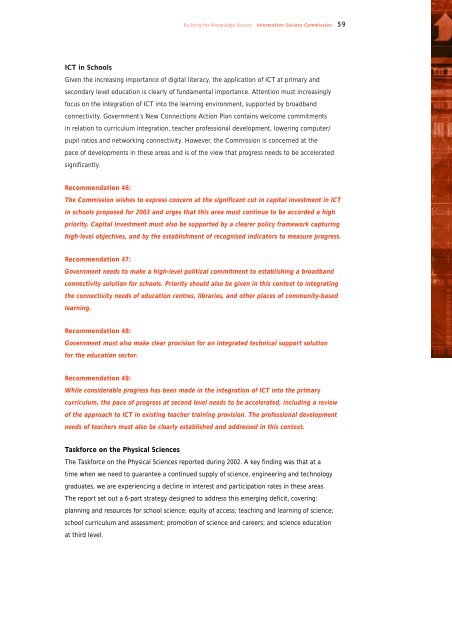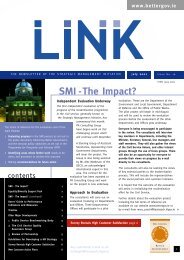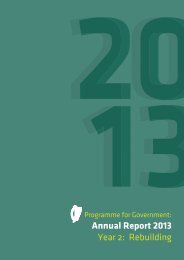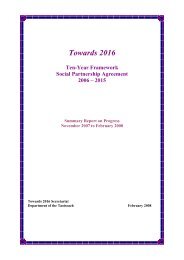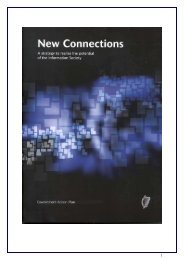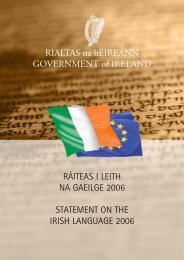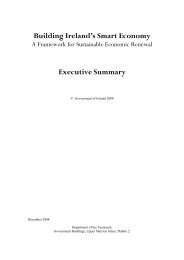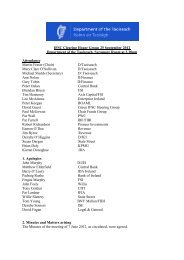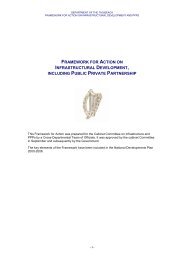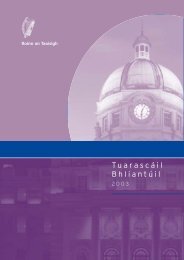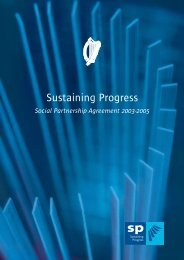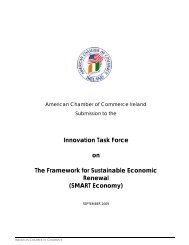Building the Knowledge Society - Department of Communications ...
Building the Knowledge Society - Department of Communications ...
Building the Knowledge Society - Department of Communications ...
Create successful ePaper yourself
Turn your PDF publications into a flip-book with our unique Google optimized e-Paper software.
<strong>Building</strong> <strong>the</strong> <strong>Knowledge</strong> <strong>Society</strong> Information <strong>Society</strong> Commission 59ICT in SchoolsGiven <strong>the</strong> increasing importance <strong>of</strong> digital literacy, <strong>the</strong> application <strong>of</strong> ICT at primary andsecondary level education is clearly <strong>of</strong> fundamental importance. Attention must increasinglyfocus on <strong>the</strong> integration <strong>of</strong> ICT into <strong>the</strong> learning environment, supported by broadbandconnectivity. Government’s New Connections Action Plan contains welcome commitmentsin relation to curriculum integration, teacher pr<strong>of</strong>essional development, lowering computer/pupil ratios and networking connectivity. However, <strong>the</strong> Commission is concerned at <strong>the</strong>pace <strong>of</strong> developments in <strong>the</strong>se areas and is <strong>of</strong> <strong>the</strong> view that progress needs to be acceleratedsignificantly.Recommendation 46:The Commission wishes to express concern at <strong>the</strong> significant cut in capital investment in ICTin schools proposed for 2003 and urges that this area must continue to be accorded a highpriority. Capital investment must also be supported by a clearer policy framework capturinghigh-level objectives, and by <strong>the</strong> establishment <strong>of</strong> recognised indicators to measure progress.Recommendation 47:Government needs to make a high-level political commitment to establishing a broadbandconnectivity solution for schools. Priority should also be given in this context to integrating<strong>the</strong> connectivity needs <strong>of</strong> education centres, libraries, and o<strong>the</strong>r places <strong>of</strong> community-basedlearning.Recommendation 48:Government must also make clear provision for an integrated technical support solutionfor <strong>the</strong> education sector.Recommendation 49:While considerable progress has been made in <strong>the</strong> integration <strong>of</strong> ICT into <strong>the</strong> primarycurriculum, <strong>the</strong> pace <strong>of</strong> progress at second level needs to be accelerated, including a review<strong>of</strong> <strong>the</strong> approach to ICT in existing teacher training provision. The pr<strong>of</strong>essional developmentneeds <strong>of</strong> teachers must also be clearly established and addressed in this context.Taskforce on <strong>the</strong> Physical SciencesThe Taskforce on <strong>the</strong> Physical Sciences reported during 2002. A key finding was that at atime when we need to guarantee a continued supply <strong>of</strong> science, engineering and technologygraduates, we are experiencing a decline in interest and participation rates in <strong>the</strong>se areas.The report set out a 6-part strategy designed to address this emerging deficit, covering:planning and resources for school science; equity <strong>of</strong> access; teaching and learning <strong>of</strong> science;school curriculum and assessment; promotion <strong>of</strong> science and careers; and science educationat third level.


